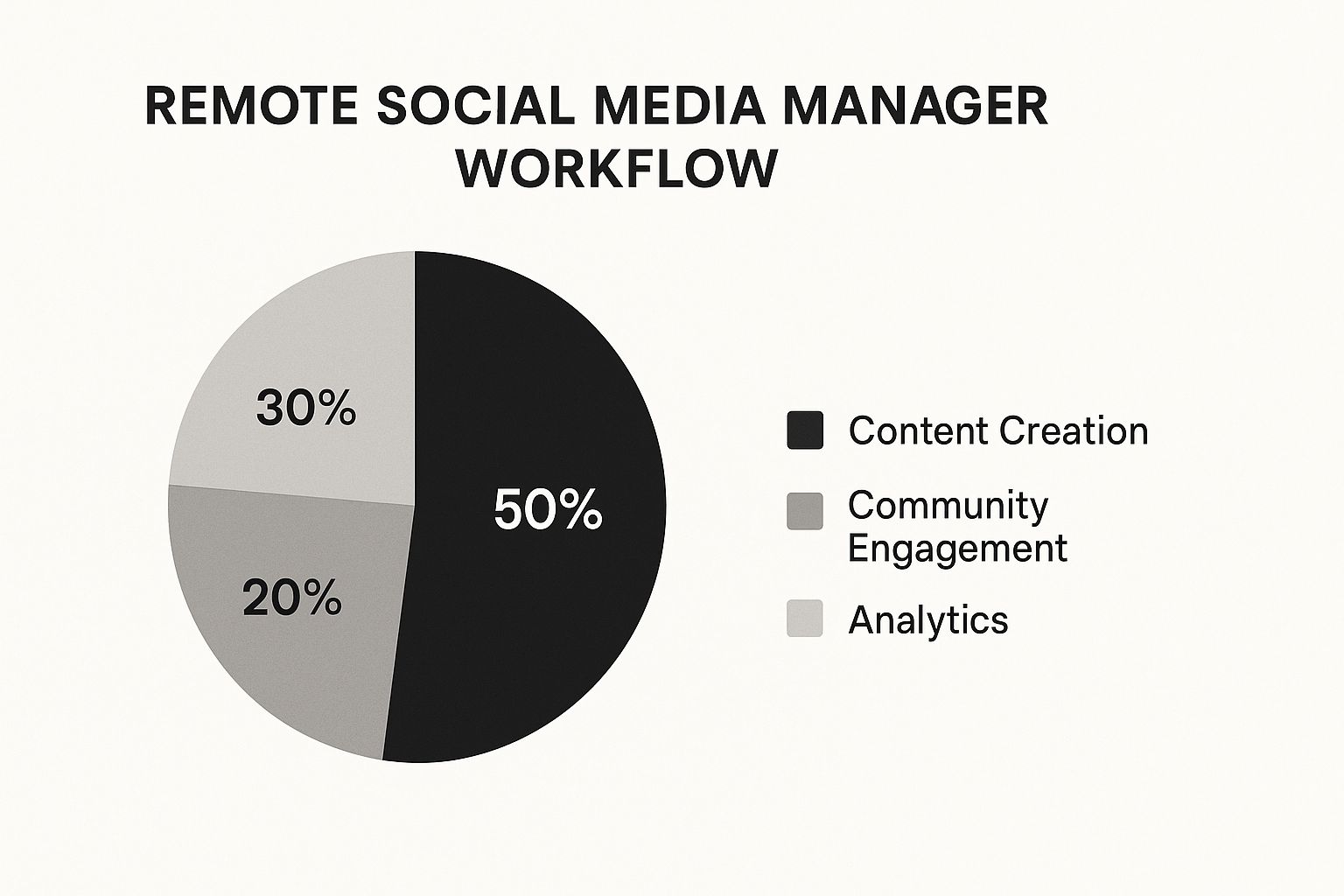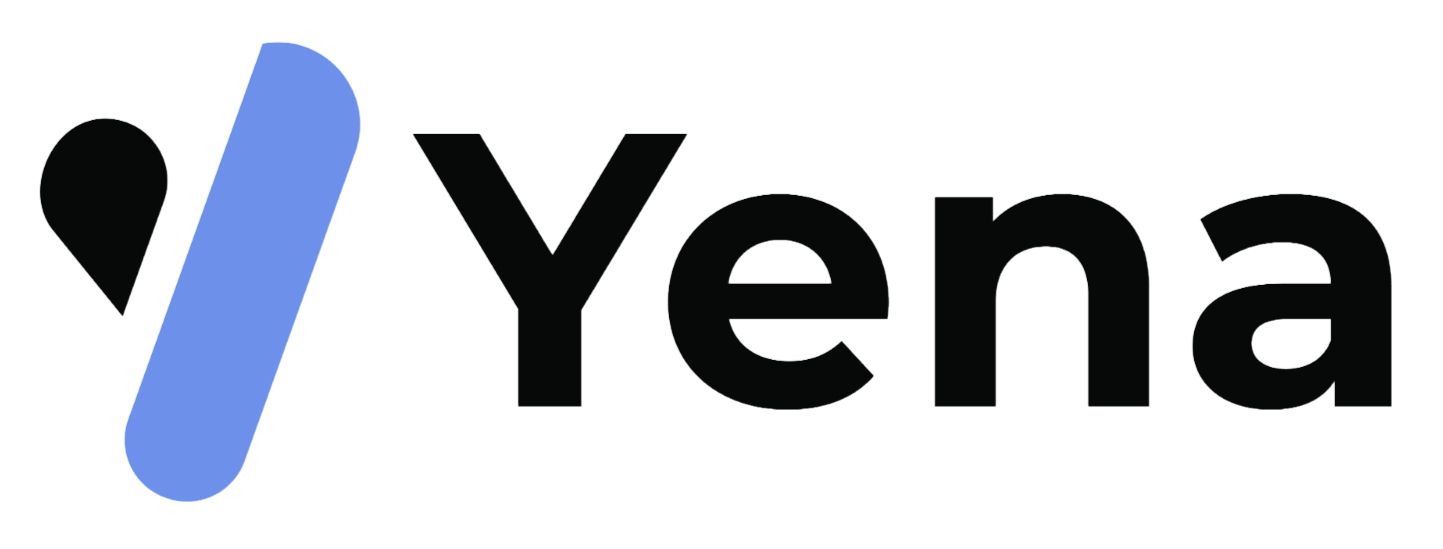Find the Best Remote Social Media Manager Today
- Janis Kolomenskis
- Jun 23
- 13 min read
Updated: Jun 25
The Reality of Remote Social Media Management Today
The conversation around hiring has really changed, hasn't it? It’s no longer about just filling a seat in an office; it’s about finding the absolute best person for the job, no matter their postcode. When it comes to a remote social media manager, this shift opens up a world of possibilities that go way beyond your local talent pool. Smart business owners are realising the perks aren't just about saving a bit on overheads. The real prize is getting access to a global network of specialised professionals who bring niche industry experience and fresh perspectives to the table.
Think about it this way: your perfect candidate probably doesn't live within a 30-kilometre radius. They could be a wizard in B2B tech marketing living three time zones away, or an expert in consumer e-commerce who deeply understands your target audience’s culture because they're a part of it. A top-tier remote professional brings more than just skills; they bring a completely different and often more efficient way of working.
What Separates Exceptional Remote Talent
So, what makes a remote social media manager truly exceptional? It all comes down to their proactivity and brilliant communication. They don't just sit around waiting for instructions. Instead, they anticipate what your brand needs, spot opportunities in emerging social trends, and report back with insights backed by solid data. This isn’t just about being good at scheduling posts; it’s about being a strategic partner who takes genuine ownership of your brand’s digital presence.
Their success is usually built on a few key pillars:
Self-Discipline: They can manage their own schedule and hit deadlines without someone looking over their shoulder.
Technical Proficiency: They are masters of collaboration tools like Slack or Asana, project management software, and analytics platforms.
Strong Written Communication: They have the knack for clearly explaining strategy, reporting results, and building relationships, all through text.
Understanding the Modern Market
This new way of working has also reshaped what people expect in terms of compensation. The talent market is now global, and so are the salary benchmarks. Take Latvia, for example, where the rise of remote work has had a huge impact on the social media profession. A traditional, office-based role might offer a standard local salary. However, remote opportunities available to Latvian professionals can command pay that is more than double the local average, with some roles reaching between €70,000 to €73,500 annually.
This just goes to show how talented professionals from regions like Latvia are plugging into a much wider, more competitive international job market. You can explore more salary insights for remote roles in Latvia to get a better feel for the current rates. Understanding these trends is crucial for putting together a competitive offer that will attract the high-calibre remote social media manager your business truly needs to thrive.
Spotting Exceptional Remote Talent Before Your Competitors Do

Finding a great social media manager is one thing, but finding one who thrives working remotely is a completely different game. The truth is, not everyone is built for the independence and self-discipline that remote work requires. The best candidates often show their cards long before you even schedule an interview. Take a good look at their very first message to you. Is it thoughtful and personalised, or does it feel like a generic template sent to a hundred other companies? That initial contact is your first real clue about their communication skills and how much they care about the details.
After that first impression, their portfolio is where you’ll uncover the real substance. Don’t just get dazzled by pretty graphics or big follower numbers. A truly impressive portfolio tells a story of strategy and results. You want to see the why behind the what—what were the campaign goals? What was their process? And most importantly, what were the outcomes? An exceptional remote social media manager won't just say they "boosted engagement." They'll prove it with specifics, like: "achieved a 15% increase in click-through rates for a new product launch by running targeted A/B tests on Instagram Stories." That’s the kind of person who thinks about your business goals, not just vanity metrics.
Reading Between the Lines of a Portfolio
As you flip through their past work, put on your detective hat and ask a few questions to see if they're cut out for remote work:
Do they show adaptability? Look for experience across different industries or with brands that have very distinct voices. This suggests they can quickly grasp your brand’s unique personality without needing someone over their shoulder.
Is there evidence of proactive problem-solving? Maybe they spotted a wave of negative comments and launched a clever campaign to turn the tide. Or perhaps they experimented with a new platform feature before it was cool. This shows initiative.
How do they present data? Clear, easy-to-understand reports that tell a story are a sign of a great communicator who can work independently and keep you in the loop without endless meetings.
This is particularly crucial in a market like Latvia, where social media is a big deal. With around 1.41 million active social media users—that’s 75.6% of the population!—you need someone who knows how to capture that attention and convert it into real business results. You can explore more on Latvia's digital engagement rates to get a sense of the massive opportunity.
At the end of the day, you're not just hiring an employee; you're looking for a proactive business partner who happens to work from a different location. By focusing on these subtle clues that point to strategic thinking and self-motivation, you can find those amazing candidates that your competitors are missing. If you're looking to sharpen your hiring process even more, you might find our guide on top recruiting best practices to attract talent in 2025 really helpful.
Budget Planning That Attracts Top Remote Talent
Setting the right budget isn't just a numbers game; it's about creating an offer that shows you're ready for a real partnership. When you decide to hire a remote social media manager, penny-pinching is a sure-fire way to end up with lacklustre results. The best people know what they're worth, and your compensation plan is your first chance to show that you value their strategic mind, not just their ability to post content.
Naturally, experience plays a huge part. A recent graduate who's brilliant on TikTok won't have the same salary expectations as a seasoned pro who has a history of growing e-commerce sales through complex Pinterest and Facebook campaigns. But it's also about specialisation. If someone has deep knowledge of B2B LinkedIn strategies or truly gets the nuances of your niche industry, they bring immense value, and their pay should reflect that. Your budget needs to be flexible enough to accommodate these kinds of expertise.
Structuring a Competitive Offer
While a good salary is essential, it’s not the only thing that matters. Many talented remote professionals are looking for more than just a paycheque. Think about building a package that connects their success directly to your company's growth.
Here are a few ideas:
Performance Bonuses: Connect a bonus to hitting specific Key Performance Indicators (KPIs), like reaching a target cost-per-acquisition or boosting social media lead generation by a certain percentage.
Professional Development: Show you're invested in their career by offering to pay for a relevant course, a ticket to an industry conference, or an advanced certification.
Flexible Hours: This is almost a standard for remote roles, but explicitly mentioning your trust in them to manage their own time can be a huge, non-monetary perk.
The role of a social media manager is a unique mix of creative, analytical, and communication skills. The infographic below breaks down a typical workflow, making it clear why this role demands a professional with a diverse skillset.

This blend of tasks is precisely why a competitive compensation package is so important—you're hiring someone who can wear multiple hats effectively.
To give you a clearer picture of how salaries can vary, here’s a breakdown comparing local and remote roles based on experience.
Experience Level | Local Salary Range | Remote Salary Range | Key Skills Premium |
|---|---|---|---|
Entry-Level (0-2 years) | €12,000 - €20,000 | €25,000 - €40,000 | Content creation, community engagement, basic analytics. |
Mid-Level (3-5 years) | €21,000 - €30,000 | €45,000 - €65,000 | Strategy development, paid social campaigns, advanced analytics. |
Senior (5+ years) | €31,000+ | €70,000 - €90,000+ | Team leadership, budget management, multi-channel strategy. |
As you can see, hiring remotely opens you up to a global talent pool, which means you're competing on a different scale. A great example is the market in Latvia. An office-based Social Media Manager there might make around $31,000 annually. However, remote managers in Latvia working for international companies often earn between €70,492 to €73,531.
You can explore more salary data for social media managers in Latvia to see these global market dynamics for yourself. By putting together a thoughtful and competitive package, you set yourself up to attract a truly fantastic remote social media manager who will drive real results for your business.
Building a Hiring Process That Actually Works
Let's be honest: your hiring process is the make-or-break moment when searching for an exceptional remote social media manager. A rushed, sloppy approach tends to attract candidates who are just looking for any job. On the other hand, a thoughtful, strategic process pulls in professionals who are genuinely excited to build something great with you. It's time to move beyond generic job descriptions and stale interview questions and create a system that uncovers real skill and a solid work ethic.
The first move is to reframe how you present the role. A great job post reads more like an opportunity than a simple list of duties. It should speak directly to the kind of professional you want on your team. For some great tips on this, check out our guide on writing a job description that actually attracts top talent. Instead of a flat statement like, "must be proficient in Meta Business Suite," try framing it with more ownership: "You'll be the strategic mind behind our paid social campaigns on Meta, with the freedom to test, learn, and optimise a significant budget." This small shift presents the role as a partnership and attracts candidates who think strategically.
Designing a Practical Assessment
A CV can only tell you so much about a person's capabilities. The real proof is in a practical assessment. This doesn't need to be a massive, unpaid project that takes days to finish. The goal is to create a small, focused task that mirrors the actual work they’ll be doing. A well-designed assessment shows you their skills and, just as importantly, how they think.
Here are a few ideas for a focused test that gets real results:
Present a real-world scenario: "We're launching a new sustainable product line. Could you draft three Instagram posts (caption and visual concept) to announce it to our audience?"
Test their analytical eye: Give them a sample analytics report (with any sensitive data removed) and ask for three key observations and one actionable recommendation.
Check their community management style: Share a few mock customer comments—one positive, one neutral, and one tricky one—and ask how they would respond to each.
Asking the Right Interview Questions
By the time you get to the interview, the practical assessment should have already confirmed their technical skills. This conversation is your chance to dive into company fit, work style, and professional integrity. The aim is to truly understand how they operate as a remote social media manager.
Forget tired questions like, "What's your biggest weakness?" Instead, ask questions that reveal how they handle the day-to-day realities of remote work. For example:
"Tell me about a time you had to manage a project with very little direction. How did you approach it?"
"How do you stay organised and prioritise tasks when you have multiple projects on the go?"
"Describe your process for reporting on campaign performance. What metrics do you focus on and why?"
These kinds of questions give you a window into their self-discipline, communication habits, and strategic thinking. When you combine a compelling job description, a smart practical test, and insightful interview questions, you create a powerful process that consistently identifies top-tier talent and paves the way for a successful, long-term partnership.
Creating an Environment Where Remote Managers Thrive

Getting a fantastic social media manager to join your team is a brilliant first step, but the real journey begins on their first day. How you onboard and manage them will make all the difference between a new hire who thrives and one who struggles. For a remote social media manager, building a foundation of trust and clarity right from the start is non-negotiable.
This is about creating a setup that empowers them to produce their best work, not one that makes them feel like they're being watched over a digital shoulder. Micromanagement is a surefire way to drain motivation. Instead, the focus should always be on clear goals and outcomes, giving them the autonomy to figure out the best way to get there.
A solid start is all about having the right tools in place. Your new hire needs smooth access to everything they need to represent your brand online. This goes beyond just a social media scheduler; it's about building a connected, asynchronous workspace. Think about shared content calendars, a central library for all your brand assets, and a dedicated project management area. Getting these organised from the beginning creates a single source of truth, cutting down on confusion and empowering your manager to work independently.
Fostering Trust and Clear Communication
In a remote team, trust isn't built by proximity but by consistent, open communication. It’s about checking in, not checking up on them. Instead of asking, "What are you working on right now?", try framing your questions around goals and potential hurdles: "How's the content for next week's campaign coming along? Is there anything you need from my side to make sure we hit our deadline?" This approach shows you trust their workflow while keeping everyone aligned on the main objectives.
Regular, structured feedback is another key part of a strong remote working relationship. Setting up weekly or bi-weekly video calls to go over performance, look at the analytics, and brainstorm new ideas is a great practice. These dedicated sessions make communication intentional and ensure feedback doesn't get lost in a busy chat channel. A great remote team is built on purpose and support. This supportive atmosphere is what makes people want to stick around. If you’re curious about keeping your team happy long-term, you can find more great ideas in our article on [top employee retention strategies to keep top talent](https://www.yena.ai/post/top-employee-retention-strategies-to-keep-top-talent).
The Right Tools for the Job
To really set your remote partnership up for success, giving your manager the best toolkit is essential. A well-equipped manager is an effective one. Below is a quick guide to the essential tools that make remote collaboration a breeze for any social media pro.
Essential Tools and Platforms for Remote Social Media Management
Comprehensive comparison of tools needed for effective remote social media management collaboration
Tool Category | Recommended Platform | Key Features | Monthly Cost Range |
|---|---|---|---|
Project Management | Task assignments, deadlines, progress tracking, content calendars. | €0 - €25 per user | |
Team Communication | Instant messaging, dedicated channels, file sharing, video calls. | €0 - €15 per user | |
Content Scheduling | Post scheduling, analytics, optimal timing suggestions, approval workflows. | €5 - €100+ | |
Asset Management | Centralised storage for images, videos, brand guidelines, and documents. | €0 - €20 per user |
These platforms are game-changers for remote teams, making it easy to stay organised and connected, no matter where you're working from.
By carefully creating a work environment with clear expectations and the right support systems, you empower your remote social media manager to become a true strategic partner. They won't just be posting content; they'll be driving real, meaningful results for your business.
Measuring Real Results and Building Long-Term Success
Once your remote social media manager is settled in and creating content, your focus will naturally shift to the results. It's so easy to get fixated on "vanity metrics" like follower counts and likes, but these numbers rarely paint the full picture of success. Real success is about the tangible impact social media has on your business's health and bottom line. That's why it's crucial to have a clear evaluation framework from the very beginning.
This framework shouldn't be something you hand down from on high. It works best as a shared document, something you create with your manager. The goal is to connect their daily tasks to your big-picture business objectives. This isn't about setting rigid, intimidating targets; it's about agreeing on what success actually looks like. If your primary goal is lead generation, then your key metrics should be things like link clicks, form submissions originating from social media, and conversion rates—not just post engagement.
For instance, a powerful key performance indicator (KPI) could be: "Achieve a 10% month-over-month increase in qualified leads generated from LinkedIn." This gives your manager a clear, meaningful target that directly contributes to business growth.
From Good Hires to Lasting Partnerships
The relationship with a fantastic remote social media manager shouldn't feel purely transactional. To transform a successful hire into a long-term partner, you need to show you're invested in their professional journey. Talented people are always looking to learn and tackle new challenges. Feeling stagnant is the fastest way to lose a great team member.
Think about building a growth plan that shows you're committed to them. It could include:
Skill Development: Offer to pay for a course on an emerging platform like TikTok Ads or a certification in advanced analytics. This proves you care about their career, not just the tasks they're doing for you right now.
Increased Responsibility: As they consistently deliver great results, give them more ownership. This might look like handing over the entire social media advertising budget or trusting them to spearhead a major brand campaign.
Regular, Productive Conversations: Performance reviews shouldn't feel like a dreaded exam. Frame them as strategic discussions about the future. Instead of only looking back, ask forward-thinking questions like, "What new opportunities do you see for our brand on social media?" or "What support do you need from me to take on a bigger project next quarter?"
Handling Inevitable Challenges
Even in the most positive working relationships, things won't always go perfectly. A campaign might not perform as well as hoped, or a creative idea might not connect with your audience. The way you handle these bumps in the road is what truly solidifies the partnership.
When challenges arise, approach them with a problem-solving attitude, not a sense of blame. Work together to figure out what went wrong and, more importantly, what you can both learn from it. This collaborative approach builds resilience and trust, turning your manager from a contractor into a genuine strategic partner who is deeply invested in your company’s long-term success.
Key Takeaways

Finding an amazing remote social media manager is about more than just scanning a CV. It’s a thoughtful process that starts with a clear plan for your budget, how you’ll vet candidates, and how you’ll manage them for the long haul. You've got the roadmap; now it's time to bring that perfect person onto your team.
Your Hiring Checklist
To make sure you find the right person for your business, concentrate on these key areas:
Budget Realistically: Your offer needs to be attractive in a global talent pool. Do a bit of research on current remote salary standards to pull in the best applicants.
Assess Practically: Forget generic interview questions. A small, paid task that reflects their actual day-to-day work will show you so much more about their strategic mind and how they tackle problems.
Onboard Thoughtfully: From day one, make sure your new hire feels part of the team. Set up clear ways to communicate, give them access to all the tools they’ll need, and work together to set goals.
From Hire to Partner
Once your manager is part of the team, the real work begins: building a strong, lasting partnership. This is all about trusting them with the freedom to do their job, offering chances for them to grow professionally, and showing them how their work makes a real impact on the business. It’s a two-way street of communication and shared goals that turns a good hire into an essential part of your company's success.
Ready to create a hiring process that top remote talent will love? Yena’s AI-powered platform helps you build beautiful branded career pages and set up automated workflows that give every candidate a great experience. [Start hiring smarter with Yena today.](https://yena.ai)

Comments